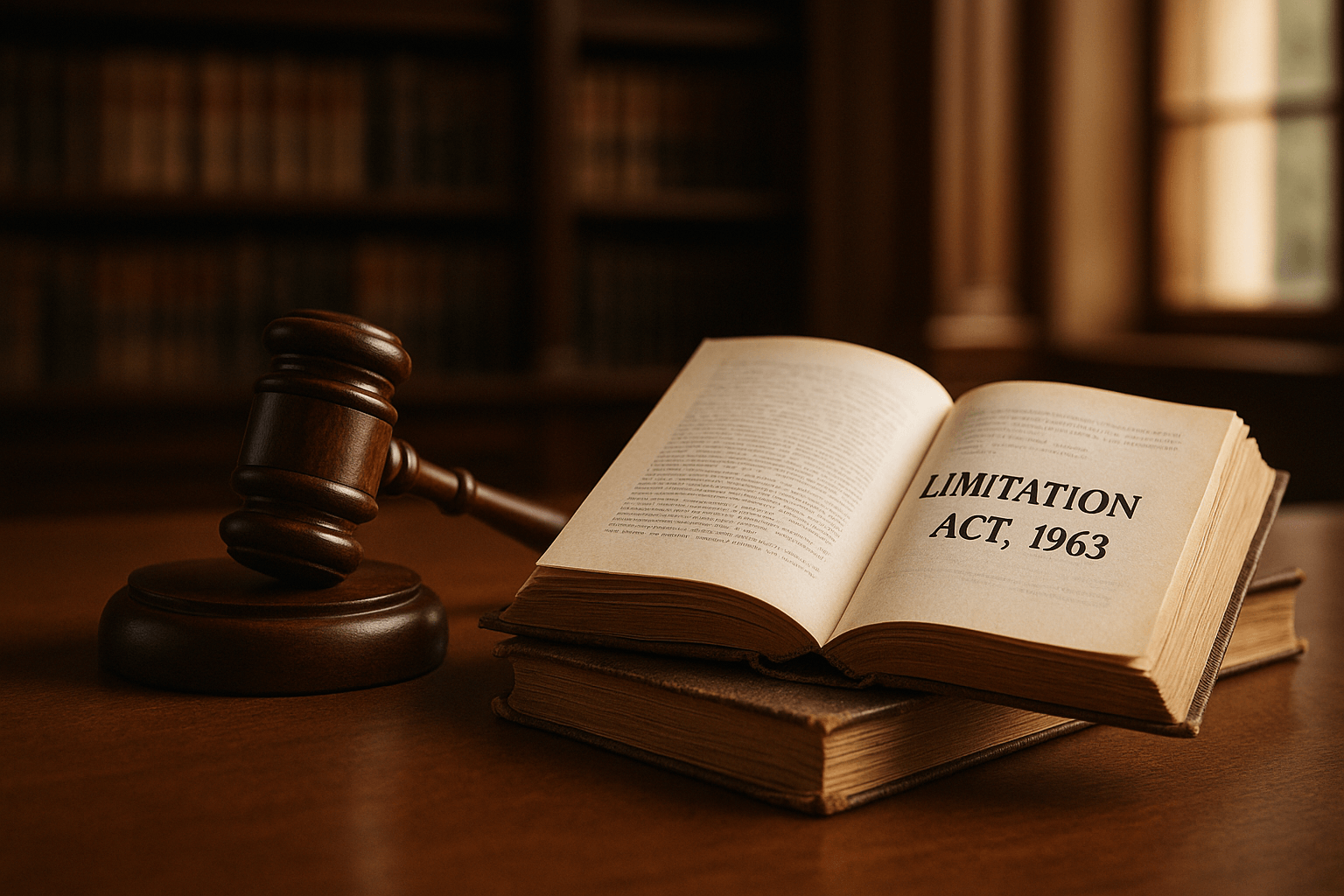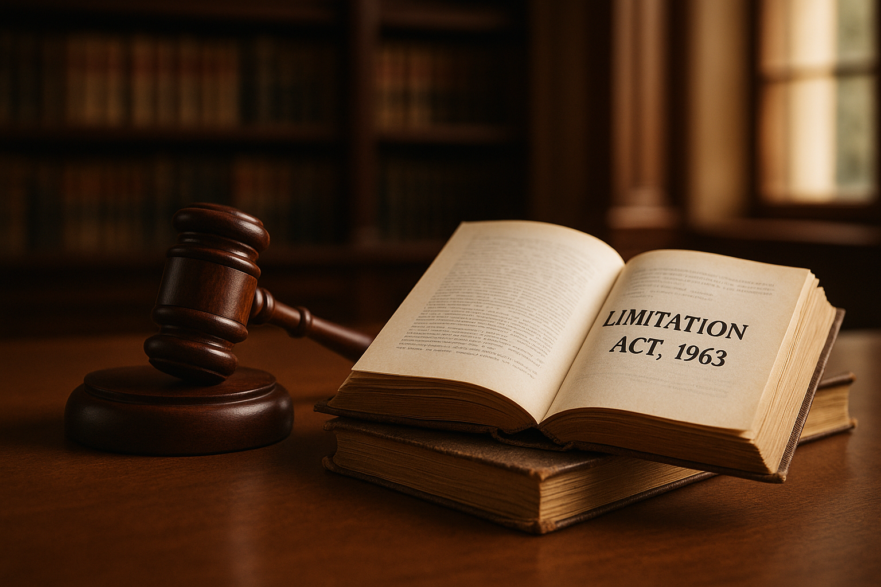
⚖️ PROCEEDINGS IN COURT WITHOUT JURISDICTION ⚖️
📘 TOPICS
- Essential ingredients of section 14 Limitation Act
- Due diligence and good faith
- Defect of jurisdiction
- “Other cause of a like nature”
- Supreme Court in B.V. D’souza v. Antonio Fausto Fernandes [1989 SC]
🏛️ Supreme Court on Section 14
- The main factor, which would influence the court in extending the benefit of Section 14 to a litigant, is whether the prior proceeding had been prosecuted with due diligence and good faith.
- The expression “defect of jurisdiction” on a plain reading means the court must lack jurisdiction to entertain the suit or proceeding.
- The words “or other cause of a like nature” are to be construed ejusdem generis with the words “defect of jurisdiction”.
📚 Preparation for RJS, DJS, PCS (J) and Other Judicial Service Exams
LIMITATION ACT EXPLAINED — SECTION 14
The Limitation Act is an important component of any and every Judicial Service exam in the country. Its thorough knowledge is a must for all aspirants of RJS, DJS, PCS (J) and every other Judicial Service exam. To help such aspirants, DELHI LAW ACADEMY JAIPUR has launched a series of study material modules on all important aspects of this important part of their syllabus.
📖 Section 14(1) — Proceedings in Court Without Jurisdiction
- In computing period of limitation for any suit:
- the time
- during which plaintiff has been prosecuting another civil proceeding against the defendant
- whether in a court of first instance or of appeal or revision
- with due diligence
- shall be excluded
- where
- the proceeding relates to the same matter in issue and is prosecuted in good faith
- in a court which is unable to entertain it from defect of jurisdiction or other cause of like nature
📘 Section 14(2)
- In computing the period of limitation for any application:
- the time
- during which the applicant has been prosecuting another civil proceeding against the defendant
- whether in a court of first instance or of appeal or revision
- with due diligence
- shall be excluded
- where
- the proceeding relates to the same matter in issue and is prosecuted in good faith
- in a court which is unable to entertain it from defect of jurisdiction or other cause of like nature
📙 Section 14(3)
- Notwithstanding rule 2 of Order XXIII of CPC:
- sub-sec (1) shall apply to a fresh suit
- instituted on permission granted by court under rule 1 of that Order
- where such permission is granted on the ground that the first suit must fail by reason of a defect in jurisdiction of court or other cause of like nature
Explanation
- In excluding the time during which a former civil proceeding was pending
- the day on which that proceeding was instituted and the day on which it ended shall both be counted
- A plaintiff or an applicant resisting an appeal shall be deemed to be prosecuting a proceeding
- Misjoinder of parties or of causes of action shall be deemed to be a cause of a like nature with defect of jurisdiction
- Rule 1 — At any time after institution of a suit:
- plaintiff may abandon his suit as against all or any of the defendants
- (a) where the Court is satisfied that a suit must fail by reason of some formal defect or
- (b) where the Court is satisfied that there are sufficient grounds for allowing the plaintiff to institute a fresh suit for the subject-matter
- it may grant the plaintiff permission to withdraw from such suit with liberty to institute a fresh suit in respect of the subject-matter of such suit
- Rule 2 — In any fresh suit instituted on permission so granted:
- the plaintiff shall be bound by the law of limitation in the same manner as if the first suit had not been instituted
📔 Explanatory Notes from DLA on Section 14
✅ Essential Ingredients of Section 14
- Before Section 14 can be pressed into service the conditions to be satisfied are:
- both the prior and subsequent proceedings are civil proceedings prosecuted by the same party;
- the prior proceeding had been prosecuted with due diligence and good faith;
- the failure of the prior proceeding was due to defect of jurisdiction or other cause of like nature;
- the earlier proceeding and the later proceeding must relate to the same matter in issue;
- both the proceedings are in a court.
🕵️♀️ Due Diligence and Good Faith
The main factor, which would influence the court in extending the benefit of Section 14 to a litigant, is whether the prior proceeding had been prosecuted with due diligence and good faith. The party prosecuting the suit in good faith in the court having no jurisdiction is entitled to exclusion of that period. The expression “good faith” as used in Section 14 means, “exercise of due care and attention”. In the context of Section 14 the expression “good faith” qualifies prosecuting the proceeding in the court which ultimately is found to have no jurisdiction.
A party which takes the risk of proceeding with the suit without impleading the necessary parties despite objection from the other party at the initial stage cannot be said to have acted in good faith taking due care and attention; consequently, such person will not be entitled to the benefit of Section 14 of the Act for excluding the time spent by him in that proceeding in a fresh suit.
⚖️ Defect of Jurisdiction
The other expressions relevant to be construed in this regard are “defect of jurisdiction” and “or other cause of a like nature”. The expression “defect of jurisdiction” on a plain reading means the court must lack jurisdiction to entertain the suit or proceeding. The circumstances in which or the grounds on which, lack of jurisdiction of the court may be found are not enumerated in the section.
There is a distinction between granting permission to the plaintiff to withdraw the suit with leave to file a fresh suit for the same relief under Order 23 Rule 1 and exclusion of the period of pendency of that suit for the purpose of computation of limitation in the subsequent suit under Section 14 of the Limitation Act.
From the provisions of sub-section (3) of Section 14 it is clear that it is in the nature of a proviso to Order 23 Rule 2. The non obstante clause provides that notwithstanding anything contained in Rule 2 of Order 23 of the Code of Civil Procedure the provisions of sub-section (1) of Section 14 shall apply in relation to a fresh suit instituted on permission granted by the court under Rule 1 of Order 23.
❓ Question
How are the words “or other cause of a like nature” are to be construed?
💡 Answer
- The words “or other cause of a like nature” are to be construed ejusdem generis with the words “defect of jurisdiction”, that is to say, the defect must be of such a character as to make it impossible for the court to entertain the suit or application and to decide it on merits.
- Obviously Section 14 will have no application in a case where the suit is dismissed after adjudication on its merits and not because the court was unable to entertain it.
- Causes of a like nature with defect of jurisdiction:
- Misjoinder of parties
- Misjoinder of causes of action
Authority: B.V. D’souza v. Antonio Fausto Fernandes [1989 SC]
📚 Continue Your Limitation Act Preparation
Don’t stop here! Strengthen your knowledge of the Limitation Act with our other fully solved tests:
📘 Free Study Material for Judiciary Aspirants!
Download our FREE study material prepared by Delhi Law Academy’s expert faculty.
❓ Frequently Asked Questions on Section 14 of the Limitation Act
Good faith means the litigant genuinely believed that the earlier court had jurisdiction, without any intention to delay or misuse the process.
- Roshanlal v. R.B. Mohan Singh (1975) – emphasized good faith requirement.
- Union of India v. West Coast Paper Mills (2004) – clarified that Section 14 applies to writ proceedings too.
- Consolidated Engg. v. Principal Secy. (2008) – reinforced liberal interpretation of Section 14.
Contact us
📍 Delhi Law Academy – Jaipur Branch
6C, Tower 2, Coaching Hub, Pratap Nagar, Jaipur – 302033
📞 Phone:
+91 9911916552
+91 8447285606
✉️ Email:
contactus@delhilawacademy.com

